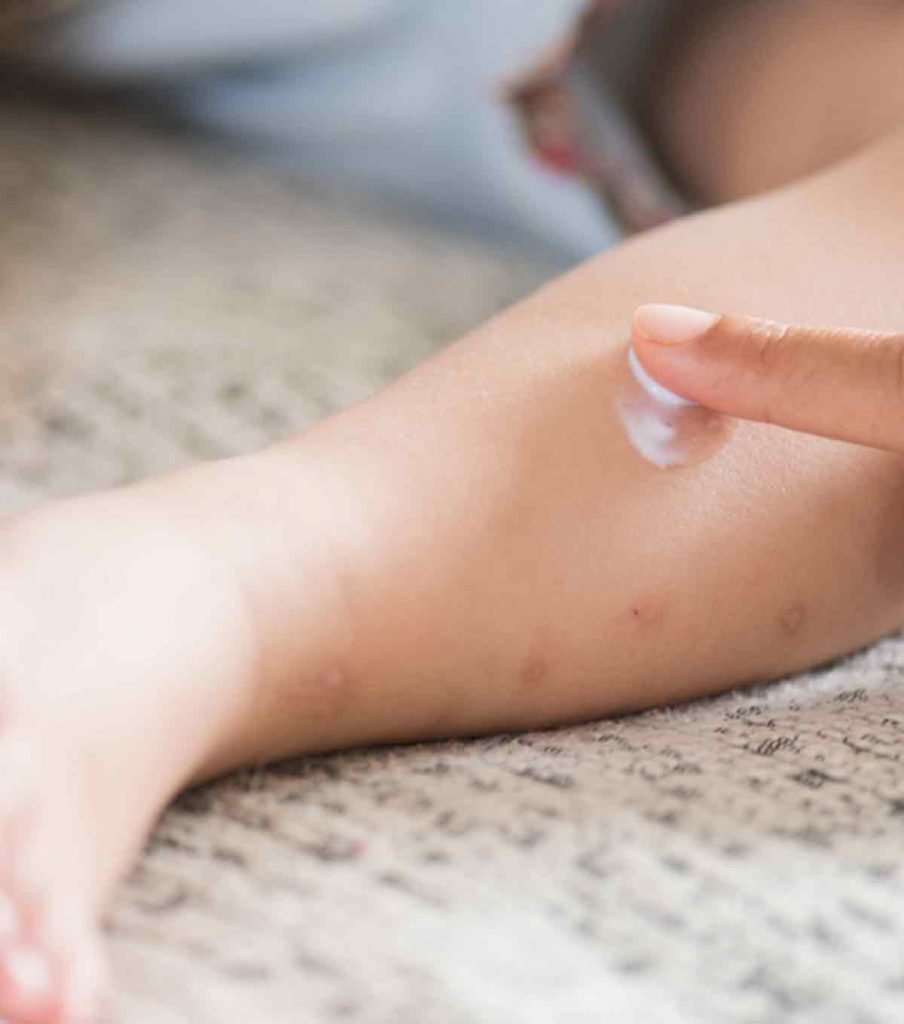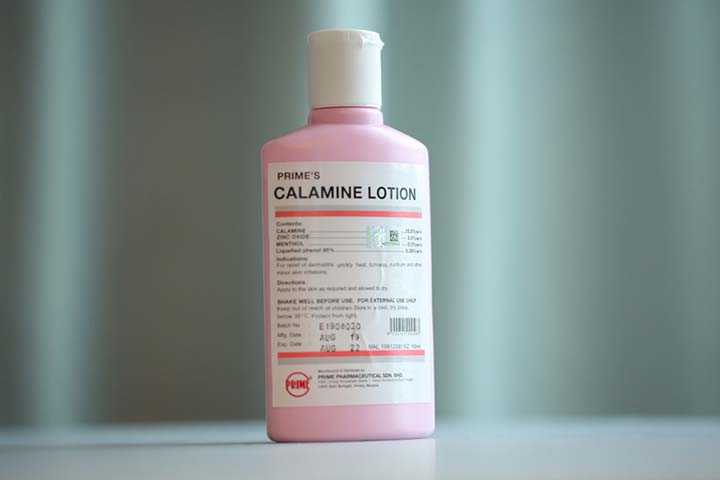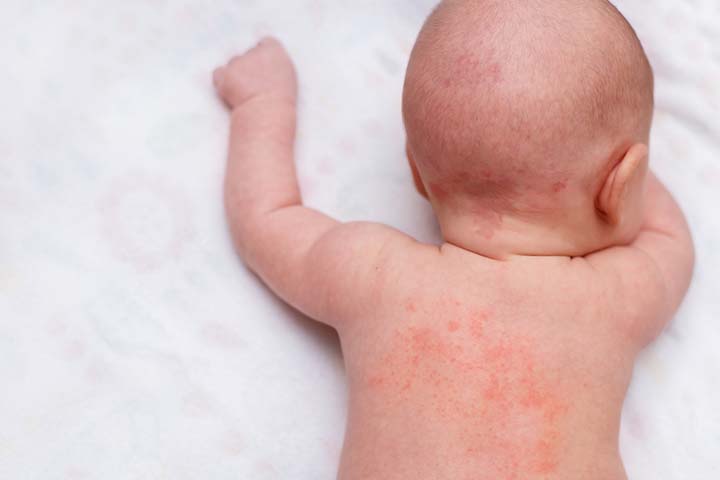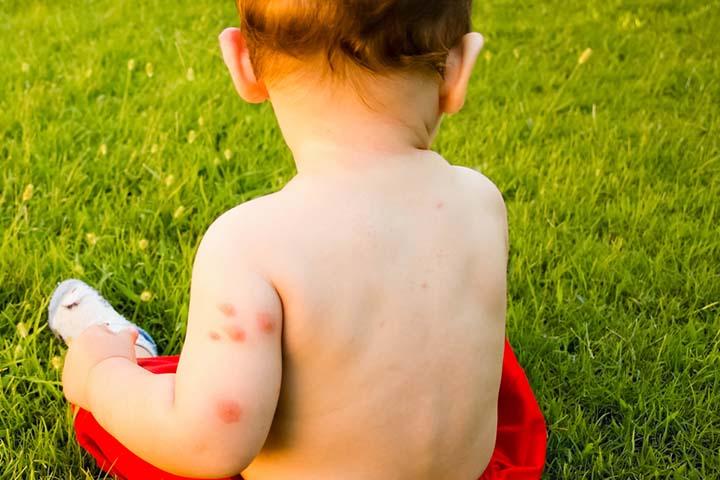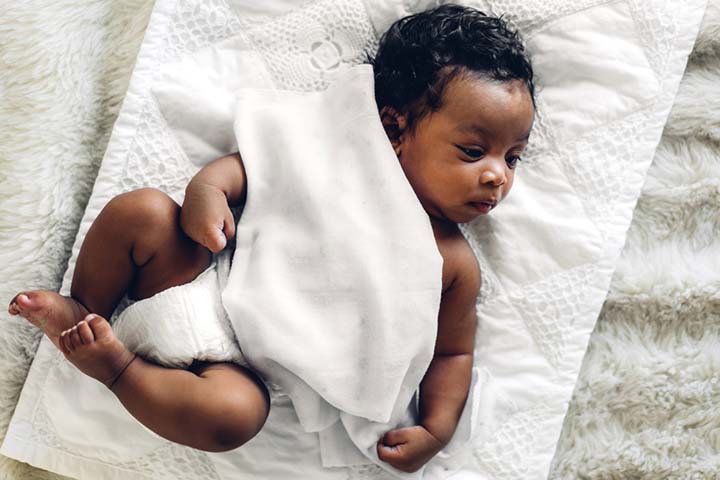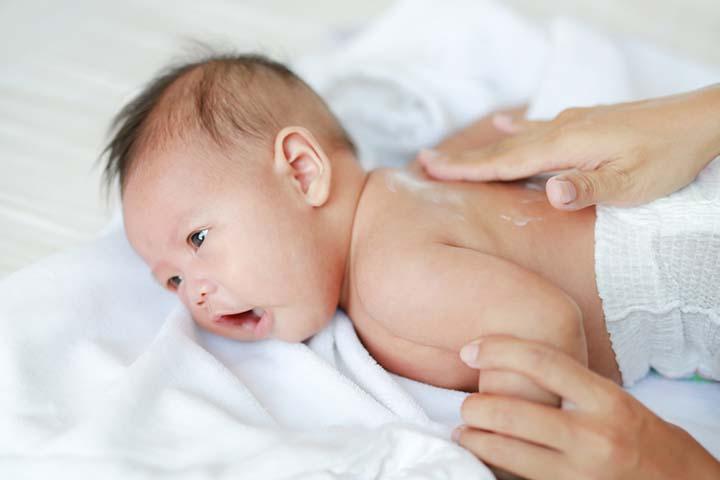Calamine lotion is a popular skin lotion used across all age groups. The topical lotion has been available as an over-the-counter medicine for decades. The anti-itch and cooling properties make it a widely used skin care product. But is it safe to use calamine lotion for babies? In this MomJunction post, we tell you Calamine lotion for babies is a popular over-the-counter product for relieving symptoms of several skin ailments. The lotion is known for its anti-itch properties and cooling effect on topical application (1). Many parents turn to calamine lotion to manage simple skin problems in infants.
Read this post to know the safety, potential uses, possible side effects, and precautionary measures for the use of calamine lotion in babies.
Is Calamine Lotion Safe For Babies?
Calamine is a mild and gentle lotion that can be safely used for relief from skin irritation and other skin problems in babies. The lotion also has astringentiXA property of a substance that helps in removing excess oils and tightening pores properties, which constrict skin tissue to help provide the baby relief from skin inflammation.
Although calamine lotion is considered baby-friendly, it is vital to consult the pediatrician before use.
Uses Of Calamine Lotion For Infants
The following are the possible conditions where calamine lotion might be useful. However, do not use them without consulting the doctor.
1. Oily skin
Calamine lotion helps manage excessively oily skin owing to its mild drying action on the skin and yet moisturise the skin (2).
2. Pruritus
Pruritus is skin itchiness, which might be localized or generalized. It might happen due to skin reactions or due to systemic disorders. Calamine lotion helps in reducing itchiness owing to its cooling or skin-soothing effect (2).
3. Heat rash
Heat rash is characterized by fine, pink-colored skin rashes caused due to overheating. Calamine lotion has a cooling effect on the skin and helps relieve the prickly feeling (3).
4. Sunburn
It helps heal the skin irritated by sunburns (4).
5. Poison ivy, poison oak, and sumac
All these plants release an oily sap containing a compound called urushiol, which on contact with skin causes severe itchy rashes and blistersiXPainful swelling (or bubble) on the skin’s outer layer, containing fluid-filled cavities. Though babies may not directly come in contact with poison ivy, adults, older children or even pets may sometimes become the carriers. Calamine lotion could help soothe skin affected by urushiol (5).
6. Miliaria
Miliaria is a severe form of heat rash and is often seen on skin folds and parts of the head, neck, and upper chest. It is caused due to blocked sweat glands. Calamine lotion can help provide relief from miliaria (6).
7. Insect bite
Calamine lotion helps in soothing and coating the skin that is irritated due to insect bite (7).
8. Chickenpox blisters
Chickenpox blisters not only cause itching and discomfort, but they may stay even after the illness is gone. The topical application of calamine lotion clears chickenpox blisters and provides relief (8).
9. Scabies
Scabies causes intense itchiness and skin irritation due to rashes. Calamine lotion can be used to reduce itchiness (9).
10. Eczema
According to the Centers for Disease Control and Prevention, the incidence of eczema among children aged zero to five is estimated to be 10.4%. Zinc is a component of calamine lotion and could help relieve baby eczemaiXA common skin condition characterized by itchy, red, and dry skin, which is also known as atopic dermatitis (10).
11. Hives
Hives cause severe skin irritation, which can be soothed through calamine lotion (11).
12. Psoriasis
US Food and Drug Administration (FDA) recommends calamine lotion to treat itchiness caused by psoriasisiXA chronic, proliferative, inflammatory skin disease that causes skin dryness and itchiness (12).
13. Shingles
The blisters caused by shingles burn and are painful. They might also crack open and bleed. Calamine lotion acts as an itch medication for the irritated skin (13).
14. Hand, foot, and mouth disease
Babies affected by hand, foot, and mouth disease develop itchy blisters all over their bodies. Calamine lotion can help in imparting coolness to the skin and reduce itchiness (14).
15. General skin irritation
Calamine lotion can be useful for relief from general skin irritation (15).
Some people use calamine lotion for the treatment and management of cradle cap and diaper rash in babies. However, there is not enough medical evidence to substantiate its use. Seek medical help if you see a skin rash worsening or increasing in number.
Calamine is mostly a dermatologist-recommended lotion for adults. However, it is crucial to seek a pediatrician’s consent before using it on babies since there is a lack of sufficient studies to confirm its skin healing and skin-protectant benefits for infants.
How To Use Calamine Lotion For Babies?
Consider the following points while using calamine lotion for your baby (16).
- Read all the drug information on the label carefully.
- Shake the bottle of calamine lotion well before use.
- Wash and dry the affected area before applying the lotion each time.
- Use a cotton ball, face cloth, or pad to apply a thin film of the lotion evenly.
- Allow the medicine to dry up. You may put mittens on the baby’s hands to avoid them from rubbing the lotion off.
- Apply a generous amount of lotion on the affected skin two to three times daily.
- If you miss a dose, apply as soon as you remember or apply the next scheduled dose.
The doctor will tell you about the quantity of calamine lotion that you need to apply to your baby. Follow all the instructions stated by the doctor, including the time to apply the lotion.
Possible Side Effects Of Calamine Lotion For Babies
Calamine lotion is a commonly used agent and is usually well-tolerated by babies. However, you should discontinue its use and contact a doctor if the baby displays the following skin signs after the use of calamine lotion (1).
- Redness
- Rash
- Pus discharge
- Hives
- Difficulty in breathing
- Swelling of your face, lips, tongue, or throat.
Always keep the bottle of lotion out of the baby’s reach. Do not panic if your baby accidentally ingests calamine lotion. Wipe the baby’s mouth gently and offer them some water to drink if they have accidentally licked a bit of the lotion. Ingestion of calamine might cause minor symptoms, such as nausea, vomiting, or diarrhea (17). However, if the baby has consumed a large quantity or symptoms persist, then promptly take your baby to the doctor.
Precautions To Take While Using Calamine
Calamine is usually safe to use. However, take the following precautions to avoid any side effects of calamine lotion (16).
- Do not use calamine without consulting the doctor
- It is for external use only
- Keep it away from eyes, nose, mouth, genitals, and mucus membranes
- Do not apply on severely injured skin, open wounds, or oozing wounds
- Always check for the product expiry date before use
- Do a small skin patch test before applying the lotion generously to the entire body
- Discontinue the use of lotion if the rash appears
- Always keep it away from the child’s reach
- Follow the instructions on the label
Calamine may not be commonly included in the typical range of baby skincare products, so it is advisable to be cautious when considering its application on your baby’s delicate skin.
You will find calamine lotion in almost every household as it has a soothing effect on itchy and irritated skin. It effectively improves oily skin and relieves itchiness, sunburn, prickly heat, and other rashes and blisters. Using calamine lotion for babies is usually considered safe for various skin problems. However, it is best to use it after consulting a doctor since babies have soft and sensitive skin. Avoid usage if you observe blood or pus from the rashes or suspect the skin problem to be an allergic reaction.
Key Pointers
- Calamine lotion may be used to treat heat rashes, pruritis, sunburns, insect bites, etc., in babies.
- Skin redness, rashes, hives, and pus discharge are a few possible side effects of calamine lotion.
- Stop using the lotion if any rashes appear on the baby’s body.
